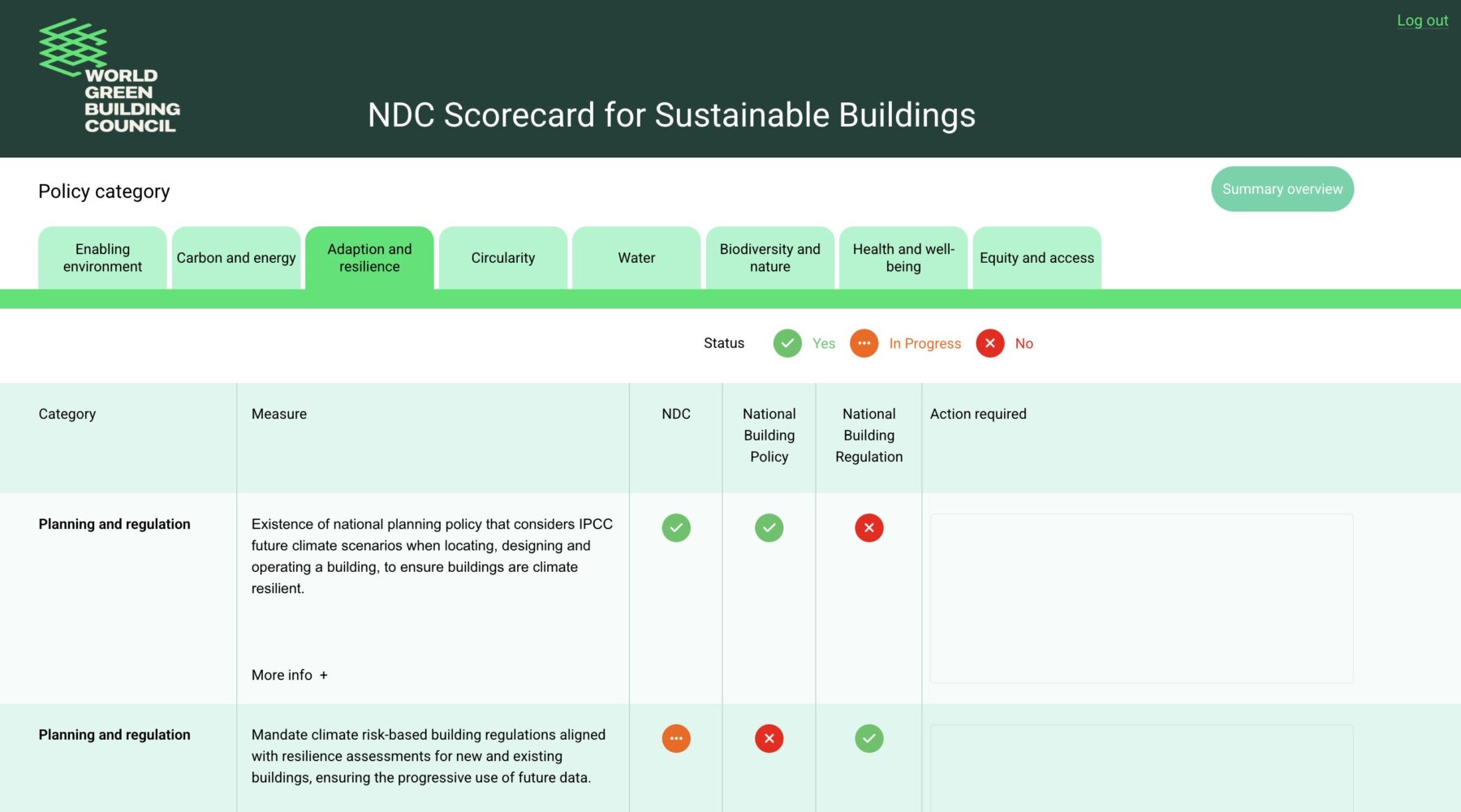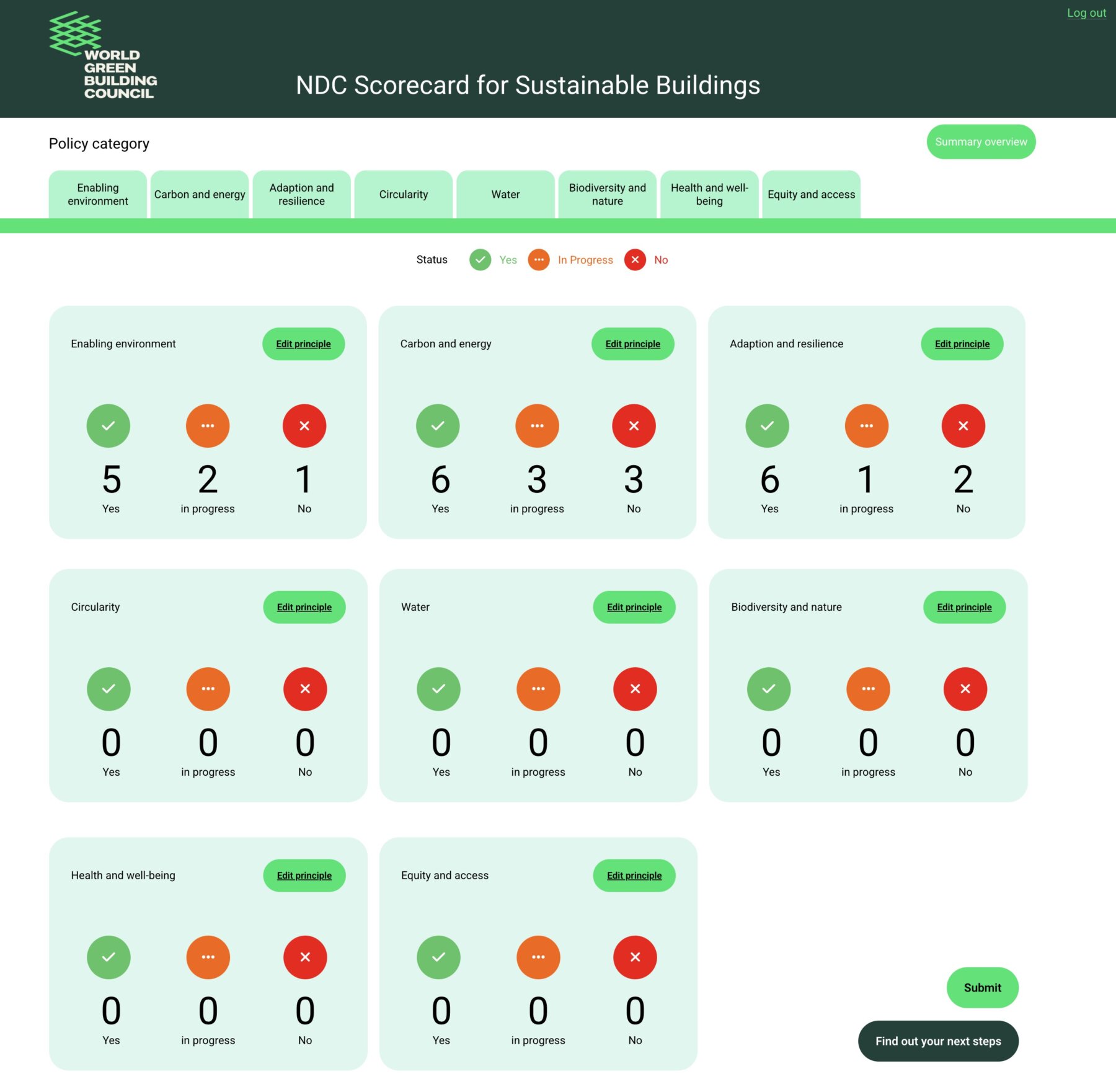The climate action plans (NDCs) we make in 2025 will shape policies and economies for the next decade. By being bold on buildings, countries can attract investment, create new green jobs, improve energy security, lower people’s energy bills, and scale climate action to meet climate targets.
Our ‘NDC Scorecard for Sustainable Buildings’ supports countries to evaluate and strengthen their national-level plans and policies. It’s time to #BeBoldOnBuildings.
The NDC Scorecard is a free digital tool that helps governments and key stakeholders to:

The Scorecard includes the following policy categories:
In addition, the Scorecard provides a summary overview of your progress, and guidance on how to prioritise the next steps for your climate action plans, policies and regulations.

The Scorecard is intended to be used by policy makers and other relevant stakeholders, alongside their local Green Building Council, who want to assess how buildings are reflected in their Nationally Determined Contributions (NDCs) and being implemented through their national building policies and regulations.
All other users can also access the full NDC Scorecard functionalities.
It is recommended that the Scorecard is used in workshops, which include different participants from the built environment community including policy makers, designers, developers, funders, NGOs and other industry professionals.
Nationally Determined Contributions, or NDCs, are national climate action plans submitted by each country under the Paris Agreement. A country’s NDC outlines their strategy to reduce greenhouse gas emissions to enable the collective global goal of limiting temperature rise to 1.5ºC and adapt to the impacts of climate change.
The Paris Agreement requires that NDCs are updated with increasingly higher ambition, taking into consideration each country’s capacity.
The next round of updated NDCs are due in 2025. It is absolutely critical that the next batch of NDCs accelerates the transition and closes the gap to 1.5ºC. This can be achieved by recognising the role that buildings can play as a climate solution.
To meet global 2030 climate targets, nation’s must now collectively reduce emissions by 42%. Collectively, national commitments remain insufficient, with NDC commitments falling far short of the 1.5ºC goal, with current commitments on track for 2.6–3.1ºC of warming over the course of the century.
We know that the buildings and construction sector is a key driver of greenhouse gases, consuming 32% of global energy and contributing to 34% of global CO2 emissions. Therefore they present a huge opportunity to enable countries to meet their climate goals, as well as attracting investment, creating new green jobs, improving energy security, and lowering people’s energy bills.
The Scorecard was initially developed by WorldGBC and five pilot Green Building Councils (GBCs) from different global regions – Brazil, Colombia, Egypt, Nigeria and the Philippines.
The development process also included local stakeholders and political actors, including GBCs, industry stakeholders and international organisations including C40 cities, CEMEX, Climate Champions Team, Climate Group, Energy Transition Commission, the GlobalABC, Global Optimism, IEA, NDC Partnerships, Saint Gobain, SE4ALL and WRI. The process included over 50 workshops worldwide with 1,000 stakeholders from government, industry and finance.
Over 40 GBCs have now used the NDC Scorecard to evaluate their country’s climate action plans. This has resulted in 150 built environment policies recommended to 19 governments.
To date, 16 Action Plans have been created by Green Building Councils providing a gap analysis between best practice policy measures and what’s included in their country’s NDC.
Each Action Plan provides a specific call to action and priority policy measures for policymakers and implementers across government, industry and finance sectors. The pilot GBC reports are available below:
To write your own Action Plan, we recommend using our NDC Scorecard and hosting a workshop with key country stakeholders to ensure alignment.
Use our Action Plan template or speak to your local Green Building Council for support.
To date, tangible policy outcomes from the NDC Scorecard project include: two new national policies developed in Brazil, integrations within updated NDCs with five regulatory instruments in Chile’s NDC3.0, aligning with national recommendations, as well as four actions incorporated into Morocco’s NDC.
Six new building policies have been integrated directly into Nigeria’s NDC — with coverage including the integration of energy efficiency and climate resilience into the national building code, the implementation of two smart, green and climate-resilient cities per geographical zone, and mandatory hazard mapping and risk zoning in local planning.
The analysis from 16 Action Plans has revealed the following global themes for NDCs:
Governments:
Industry:
Finance:
For support with the analysis of your NDC, policies and regulations, or to help develop a decarbonisation roadmap for the built environment, get in touch with your local GBC today.
WorldGBC hosted a webinar to discuss the gaps and opportunities for policymakers and industry to be bold on buildings. Watch the full webinar below.